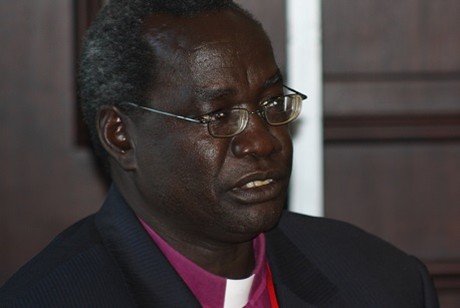Calls for unity in South Sudan

The Primate of the Episcopal Church of Sudan has called on the people of South Sudan to be "united in order to achieve lasting national healing, peace and reconciliation".
The Most Reverend Daniel Deng Bul, who is also Bishop of Juba, made the call in a strategic paper developed by his office to help guide the peace process. Archbishop Deng was appointed chairperson of the national reconciliation committee by the President of South Sudan Salva Kiir in April this year to facilitate and the 'healing the mental wounds' in the country.
"God created and placed you here in South Sudan to live together in peace and harmony," the Archbishop wrote. "We attained this freedom as a united people and it is very important that you remember that it is God who has helped this country gain its freedom."
Abp Deng bemoaned the high levels of violence in the country even though all the tribes participated in the struggle for liberation. He said, "It is distressing to see the very people who struggled shoulder to shoulder now butchering each other as though they have forgotten where God has taken us through.
"We have to recognise that we have wounded ourselves through cattle stolen from each other, abducted children and women, land grabbed," he wrote. "We have killed and wounded one another and destroyed our own property. We have spawned a culture of violence, corruption, nepotism, and inequity. We cannot continue this way. Enough is enough!"
Archbishop Deng acknowledged that South Sudan's long track records of successive initiatives, combined with deep and fresh emotional wounds from the civil war suggest that the road to national healing, peace and reconciliation will be difficult. However he stated that there are opportunities on which any attempt at reconciliation should be anchored including a robust civil society sector and growing public demand for peace.
"It is our faith in God, which brings us together and gives us the strength and courage to heal ourselves," said the Archbishop. "If there is no spiritual foundation, our attempts at reconciliation will be flawed and it will not succeed [but] the people of South Sudan are deeply religious, whether followers of Christianity, Islam or traditional religions."
Abp Deng reminded the people of South Sudan that it is their responsibility to build and bestow a sense of collective responsibility to their children and future generations.
He said that while forgiveness is painful it is the 'bitter pill' that every South Sudanese needs to swallow. "We have to swallow our pride for the sake of the survival of our young nation. The pride of tribe, of clan, of class, of creed, of political party, and of personal ambition must not obscure the focus on the future of our nation."
"We cannot have fellowship without forgiveness, reconciliation and healing. We need to exercise mercy towards each other. Now is the time to stand together as a nation, as we have done before when the need is great," advised Abp Deng.
The high-level National Reconciliation Committee of the National Program for Healing, Peace and Reconciliation, which has since set up State Committees for the peace process in all the ten States, is at the final stages of setting up a National Secretariat, to be headed by a General Secretary.
The Archbishop has however cautioned the public and the media to avoid rushing to label parts of the process as "success" or "failure". He explained that "reconciliation is a long-term process and it will have its ups and downs. If one part of the process is seen not to be working well lessons will have been learned and it will be redesigned."
"If there is conflict or controversy, it is simply an indication of another area where reconciliation is needed," said the Archbishop. "The success of the process will be judged by the state of the nation in five, ten or twenty years' time, not on short-term issues.
"Therefore let us be patient as we move along. Let us all join hands to remove every obstacle from the way of the people of the Republic of South Sudan."
Source: Anglican Communion News Service











